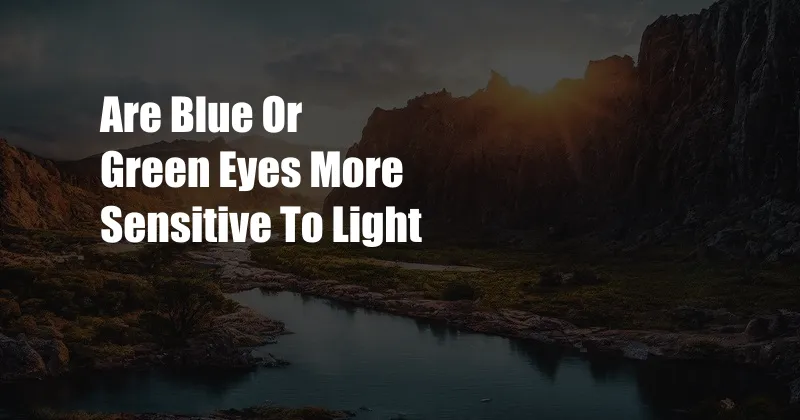
Are Blue or Green Eyes More Sensitive to Light?
Have you ever glanced at someone with vibrant blue or verdant green eyes and wondered if their vision differed from your own? Eye color can hint at unique characteristics and traits, including sensitivity to light. Let’s delve into the world of eye color and discover which hue holds the key to greater light sensitivity.
The enchanting hues of our eyes, a testament to nature’s artistry, are determined by the amount and distribution of melanin, the pigment responsible for skin and hair color. Darker eyes, such as brown or black, contain more melanin, while lighter eyes, such as blue or green, have less. This difference in melanin content influences not only eye color but also light sensitivity.
Melanin and Light Absorption
Melanin acts as a protective barrier against harmful ultraviolet (UV) rays from the sun. It absorbs and scatters UV radiation, preventing it from damaging delicate eye tissues and the genetic material within cells. Darker eyes, with their higher melanin content, provide more robust UV protection, reducing the risk of eye damage from prolonged sun exposure.
However, this protective advantage comes with a slight drawback: decreased light sensitivity. Melanin absorbs visible light as well as UV rays, making dark-eyed individuals less sensitive to light in general. They may need brighter light to see clearly and may experience glare and discomfort in well-lit environments.
Lighter Eyes and Increased Sensitivity
In contrast to dark eyes, lighter eyes, such as blue or green, contain less melanin. This reduced melanin content means they absorb less visible light, making them more sensitive to light overall. Individuals with blue or green eyes may find it easier to see in dimly lit conditions but may also experience discomfort in bright sunlight.
This increased light sensitivity can manifest in several ways. People with lighter eyes often report being bothered by glare and reflections, especially from bright surfaces such as snow or water. They may also experience light-induced headaches, eye strain, and difficulty seeing in low-light conditions.
Tips to Manage Light Sensitivity
Regardless of eye color, protecting your eyes from harmful UV rays is crucial for maintaining good vision. Here are a few tips to help manage light sensitivity, whether you have blue, green, or any other eye color:
- Wear sunglasses with UV protection: Sunglasses are an essential accessory for protecting your eyes from the sun’s harmful rays. Choose sunglasses that offer 100% UVA and UVB protection to ensure optimal eye protection.
- Use artificial tears: Artificial tears can help lubricate your eyes and reduce discomfort caused by light sensitivity. They are especially useful in dry environments or when spending extended periods in front of a computer screen.
- Adjust lighting in your home and workplace: Dim or indirect lighting can help reduce glare and discomfort for individuals with light-sensitive eyes. Consider using curtains or blinds to block out harsh sunlight and adjusting the brightness of your computer screen.
FAQs about Light Sensitivity and Eye Color
Q: Why do people with blue or green eyes have more sensitive eyes?
A: Blue and green eyes have less melanin, which provides less protection from light, making them more sensitive to light.
Q: How can I tell if I have light-sensitive eyes?
A: Symptoms of light sensitivity include discomfort in bright light, glare, eye strain, and headaches.
Q: Are there any eye conditions that make eyes more sensitive to light?
A: Yes, certain eye conditions, such as uveitis, corneal abrasions, and photophobia, can increase light sensitivity.
Conclusion
While eye color can provide insights into our genetic heritage and physical characteristics, it also has subtle implications for our visual experience. Blue or green eyes, with their reduced melanin content, are generally more sensitive to light, making individuals more susceptible to glare and discomfort in bright environments. However, by embracing proper eye care practices, such as wearing sunglasses and managing lighting, those with lighter eyes can enjoy clear vision and protect their precious eyesight.
If you find yourself experiencing significant discomfort or vision problems related to light sensitivity, consulting with an eye care professional is highly recommended. They can evaluate your eyes, determine the underlying cause, and recommend appropriate treatment options to improve your visual well-being.
So, are you blue-eyed or green-eyed? Share your experiences and thoughts on light sensitivity, and let’s continue exploring the fascinating world of eye color and vision.